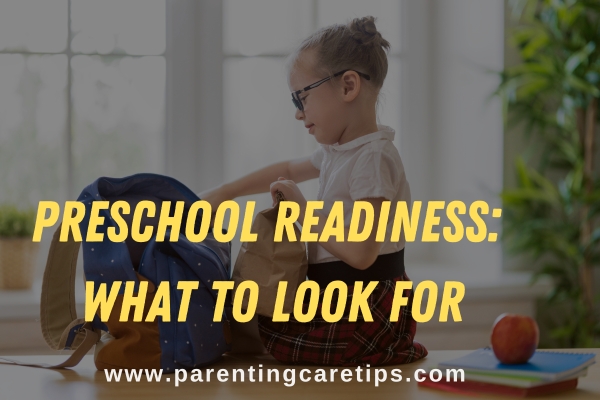Signs Your Child is Ready for Preschool
The decision to enroll your child in preschool is an exciting milestone! Preschool provides valuable social, emotional, and early academic benefits that help set the stage for later success in school.
However, it’s normal for parents to feel some hesitation about the transition too. Is your child truly ready for the preschool environment?
While every child develops at a different pace, there are some key signs of preschool readiness to look for. Here are the most used and key signs of preschool readiness to look for.
Physical Skills and Independence
1- Can your child use the bathroom and attend to basic self-care tasks fairly independently? This includes washing hands, going potty, dressing themselves, etc. Preschool requires more independence than daycare.
2- Does your child have the stamina and motor skills to participate in preschool activities that involve sitting, walking, running, and playing? Can they use scissors, glue, and hold pencils/crayons correctly? Fine motor development is important.
Social and Emotional Skills
1- Is your child comfortable separating from you and being cared for by others for a few hours? Separation anxiety is common, but should not be severe.
2- Does your child cooperate and follow simple rules and routines? For example, can they take turns, share toys, and listen when the teacher gives instructions? Basic social skills are needed.
3- Can your child communicate basic needs and talk about thoughts/feelings? Verbal skills don’t need to be advanced, but they should be able to express themselves.
4- Is your child curious and eager to learn? Do they like looking at books, singing songs, playing games? Preschool fosters a love of learning.
Cognitive Abilities
1- Does your child have adequate attention span to engage in 10-15 minutes of preschool activities at a time? The ability to focus is important.
2- Can your child understand and follow 2-3 step directions? Listening comprehension matters.
3- Is your child interested in and capable of basic numeracy and literacy skills like counting, recognizing letters/numbers, and listening to stories? These build early reading and math skills.
Bonus Signs to look for:
Playing With Other Children
Social interaction is a major component of preschool. Assess your child’s basic social skills:
- Do they show interest in other children and enjoy parallel play near peers? Can they take turns and share toys?
- Does your child understand the concept of not hurting others? Do they cooperate and avoid aggressive behaviors like biting or hitting?
- Can your child play constructively alongside other children with minimal adult intervention? Or do they require constant supervision and correction?
While preschoolers are still learning social skills, your child should not completely isolate themselves or struggle to function appropriately around peers without adult micromanaging.
Being Curious and Eager to Learn
Intellectual curiosity and love of learning are qualities that drive success in preschool. Signs your child has this natural motivation:
- Does your child frequently ask “why” questions and show interest when you explain things?
- Are they eager to “help” you with tasks and be included in what the adults/older siblings are doing?
- Does your child enjoy interactive games, songs, stories, arts and crafts, or activities that stimulate the mind?
- Can your child focus on books, puzzles, blocks, shapes/colors, etc. for 10+ minutes showing concentration and motivation?
While preschool builds academic skills, going in with innate curiosity gives your child an advantage. Their intellectual interests should be fostered, not forced through.
Conclusion:
If your child demonstrates many of these social, emotional, cognitive, and physical abilities, it’s a good sign they will thrive in preschool. Every child has strengths and weaknesses, so it’s okay if they’re not mastering every skill. Discuss any concerns with your child’s pediatrician. With your support, preschool can be an enriching experience! Learn here more about preschool habits and child growth.
FAQs:
What age is best for preschool?
Most children start preschool between ages 3-4. Many preschools have eligibility cutoffs, like requiring a child be 3 years old by September 1st to enroll in that school year. Developmental readiness is also important.
What skills should my child have before preschool?
Key skills include being able to use the toilet independently, follow 2-3 step directions, communicate needs verbally, participate in group activities, be away from parents for a few hours, and demonstrate early literacy/math skills like recognizing letters and counting.
How do I know if my child is mature enough for preschool?
Signs of maturity include your child being able to share, take turns, cooperate with others, control behavior/emotions, dress themselves, and focus on activities for 10-15 minutes. Separation anxiety and tantrums may signal immaturity.
What should my child know academically before starting preschool?
Recognizing basic colors, shapes, letters and numbers is helpful but not required. More important is showing interest in learning, looking at books, listening to stories, doing puzzles, etc. Preschool will build on early academic skills.
Is my shy child ready for preschool?
Many shy children thrive in preschool once they warm up! Give yours a chance to adjust to the new environment and make friends. If severe separation anxiety or refusal to participate persists beyond a few weeks, discuss next steps with their teacher.
How can I prepare my child for preschool?
Read books about preschool, make playdates to practice social skills, set rules and routines at home, do “practice runs” at preschool events, establish independence with self-care tasks, and communicate the excitement of this new adventure!


